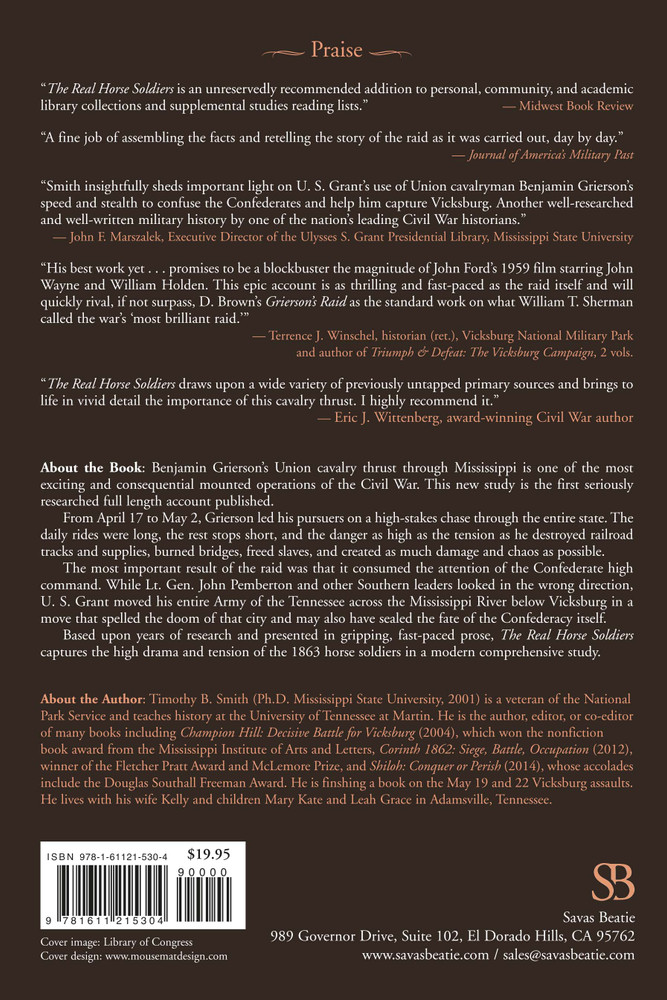The Real Horse Soldiers: Benjamin Grierson’s Epic 1863 Civil War Raid Through Mississippi (PB)
- Current Stock:
- Gift wrapping:
- Options available
- Author:
- Timothy B. Smith
- Pub Date:
- January 2020
- ISBN:
- 978-1-61121-530-4
- eISBN:
- 978-1-61121-429-1
- Binding:
- Trade paper, 6 x 9
- Specs:
- 12 maps, 36 images, index. 376 pp
- Signed bookplates:
- Will be available.
About the Book
Benjamin Grierson’s Union cavalry thrust through Mississippi is one of the most well-known operations of the Civil War. The last serious study was published more than six decades ago. Since then other accounts have appeared, but none are deeply researched full-length studies of the raid and its more than substantial (and yet often overlooked) results. The publication of Timothy B. Smith’s The Real Horse Soldiers: Benjamin Grierson’s Epic 1863 Civil War Raid through Mississippi rectifies this oversight.
There were other simultaneous operations to distract Confederate attention from the real threat posed by U. S. Grant’s Army of the Tennessee. Grierson’s operation, however, mainly conducted with two Illinois cavalry regiments, has become the most famous, and for good reason: For 16 days (April 17 to May 2) Grierson led Confederate pursuers on a high-stakes chase through the entire state of Mississippi, entering the northern border with Tennessee and exiting its southern border with Louisiana. The daily rides were long, the rest stops short, and the tension high. Ironically, the man who led the raid was a former music teacher who some say disliked horses. Throughout, he displayed outstanding leadership and cunning, destroyed railroad tracks, burned trestles and bridges, freed slaves, and created as much damage and chaos as possible.
Grierson’s Raid broke a vital Confederate rail line at Newton Station that supplied Vicksburg and, perhaps most importantly, consumed the attention of the Confederate high command. While Confederate Lt. Gen. John Pemberton at Vicksburg and other Southern leaders looked in the wrong directions, Grant moved his entire Army of the Tennessee across the Mississippi River below Vicksburg, spelling the doom of that city, the Confederate chances of holding the river, and perhaps the Confederacy itself.
Novelists have attempted to capture the large-than-life cavalry raid in the popular imagination, and Hollywood reproduced the daring cavalry action in The Horse Soldiers, a 1959 major motion picture starring John Wayne and William Holden. Although the film replicates the raid’s drama and high-stakes gamble, cinematic license chipped away at its accuracy.
Based upon years of research and presented in gripping, fast-paced prose, Timothy B. Smith’s The Real Horse Soldiers captures the high drama and tension of the 1863 horse soldiers in a modern, comprehensive, academic study. Readers will find it fills a wide void in Civil War literature.
Reviews
"A valued and significant addition to the growing library of American Civil War Histories, The Real Horse Soldiers is an unreservedly recommended addition to personal, community, and academic library collections and supplemental studies reading lists." - Midwest Book Review
"Author Smith has done a fine job of assembling the facts and retelling the story of the raid as it was carried out, day by day." - The Journal of America’s Military Past
“Major Civil War author Timothy B. Smith has done it again. He insightfully sheds important light on U. S. Grant’s use of Union cavalryman Benjamin Grierson’s speed and stealth to confuse the Confederates and help him capture Vicksburg. Another well-researched and well-written military history by one of the nation’s leading Civil War historians.” — John F. Marszalek, Executive Director of the Ulysses S. Grant Presidential Library, Mississippi State University
“Adding his best work yet to an impressive and ever-expanding list of publications, Tim Smith’s release of The Real Horse Soldiers: Benjamin Grierson’s Epic 1863 Civil War Raid Through Mississippi promises to be a blockbuster the magnitude of John Ford’s 1959 film starring John Wayne and William Holden. This epic account is as thrilling and fast-paced as the raid itself and will quickly rival, if not surpass, D. Brown’s Grierson’s Raid as the standard work on what William T. Sherman called the war’s ‘most brilliant raid.’”— Terrence J. Winschel, historian (ret.), Vicksburg National Military Park and author of Triumph & Defeat: The Vicksburg Campaign, 2 vols.
“Ulysses S. Grant proved he was the master of the strategic cavalry raid by launching Col. Benjamin Grierson’s spring 1863 cavalry ride through the heart of Confederate Mississippi. The bold and exciting raid created so much havoc within Southern command circles that Grant was able to sneak across the Mississippi River against minimal opposition, dooming Vicksburg. The Real Horse Soldiers, award-winning Western Theater historian Timothy B. Smith’s excellent new release, draws upon a wide variety of previously untapped primary sources and brings to life in vivid detail the importance of this cavalry thrust. I highly recommend it.” — Eric J. Wittenberg, award-winning author of Holding the Line on the River of Death:Union Mounted Forces at Chickamauga, September 18, 1863
Author Interview
(All copyright laws apply to this interview. However, this interview may be posted digitally on the Internet or printed for use in newspapers, newsletters, magazines, and other similar uses, provided it appears in its entirety and that notice of its use is provided to us in advance. We allow partial edited use, with advance permission. Please inquire. Include our website www.savasbeatie.com with use. Thank you)
An Interview with Timothy B. Smith, author of
The Real Horse Soldiers: Benjamin Grierson’s Epic 1863 Civil War Raid Through Mississippi
SB: Why did you write this book?
TBS: I have always been interested in the Vicksburg campaign, and am turning my professional writing attention to it after spending years on the Tennessee River campaign. Before I jumped in with both feet, I thought it would be nice to do something on Grierson’s Raid, which is one of the better known facets of the campaign. Plus, it occurred almost exclusively in my home state of Mississippi, many places where I used to live. On top of that, I really like the John Wayne movie The Horse Soldiers, inaccurate though it is.
SB: What is the book's purpose?
TBS: There hasn’t really been a major book on the raid in sixty years, so I wanted to take the story of the raid into the modern times by finding all the source material I could, especially from the soldiers on the raid to make it a true adventure story as well as sources from the Mississippians who endured it. My second goal was to put the raid firmly into the context of the campaign itself.
SB: What sources were used to compile this work?
TBS: Most of the information came from the Official Records and Grierson’s memoirs, with additional primary sources from the soldiers and citizens fleshing it out. Sadly, the troopers on the raid had much too little time to write letters home or keep diaries on the raid itself, so most of what we get is immediate post-raid letters.
SB: Did you uncover any surprises in your research for this book?
TBS: Not really. I think most everyone knows a little about the raid and its effects. But I was surprised at just how grueling the raid was and just how much it took Confederate attention away from Grant’s bigger plans.
SB: What is the target audience for the book?
TBS: Civil War scholars and buffs will be the primary target, although I think it will also appeal to the general reading public. It’s that good of a story in terms of adventure, tension, etc.
SB: Why do you think this is an important story to tell?
TBS: The raid was a major part of the Union’s success in the Vicksburg campaign, which was a major reason the North won the war. Also, I think it shows a grassroots-level view of the war that we don’t always get in histories.
SB: What should readers take away from this book?
TBS: Obviously, the story of the grueling raid and its major ramifications are forefront, but there are also life lessons that come out of it. Persistence. Never giving up. Tactics, whether in the military or business or personal. Maybe the biggest lesson is that exemplified by Grierson himself. He was a broke failure at the beginning of the Civil War and in large part because of this raid he finished a national hero with his future pretty much secure. We never know how life might turn good or bad, but we have to stick with it and ride it out, and we’ll be better for it. And it may take some adaptation. Grierson the cavalry hero was, after all, a musician first and foremost!
SB: Thank you, Tim. We appreciate your time.
TBS: You're welcome.
(All copyright laws apply to this interview. However, this interview may be posted digitally on the Internet or printed for use in newspapers, newsletters, magazines, and other similar uses, provided it appears in its entirety and that notice of its use is provided to us in advance. We allow partial edited use, with advance permission. Please inquire. Include our website www.savasbeatie.com with use. Thank you)
Timothy B. Smith (Ph.D. Mississippi State University, 2001) is a veteran of the National Park Service and currently teaches history at the University of Tennessee at Martin. In addition to many articles and essays, he is the author, editor, or co-editor of eighteen books, including Champion Hill: Decisive Battle for Vicksburg (2004), which won the nonfiction book award from the Mississippi Institute of Arts and Letters, Corinth 1862: Siege, Battle, Occupation (2012), which won the Fletcher Pratt Award and the McLemore Prize, Shiloh: Conquer or Perish (2014), which won the Richard B. Harwell Award, the Tennessee History Book Award, and the Douglas Southall Freeman Award, and Grant Invades Tennessee: The 1862 Battles for Forts Henry and Donelson (2016), which won the Tennessee History book Award, the Emerging Civil War Book Award, and the Douglas Southall Freeman Award. He is currently writing a book on the May 19 and 22 Vicksburg assaults. He lives with his wife Kelly and children Mary Kate and Leah Grace in Adamsville, Tennessee.







